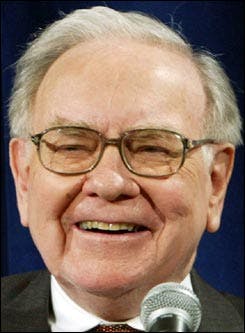Berkshire Hathaway’s David Sokol, chairman of several subsidiary companies, resigned Monday evening. He left as a possible heir to Warren Buffett’s giant conglomerate and leaves Berkshire continuing its search for its next line of successors:
Buffett’s press release about the news Wednesday came in the form of an unusually candid letter in which he said Sokol’s resignation was “a total surprise.”
Sokol told CNBC on Thursday that working for his “mentor” Buffett was “one of the best experiences of my life,” but that he wanted to invest his family’s money and “build a mini-Berkshire, if you will.”
“I’d like to do what [Buffett] did in 1965: invest my own money,” he said.
If you’ve been in HR for any amount of time, you’ve gone through the succession planning dance. You talk to the top people in the company, see how satisfied they are in their job and see where they fit in the long term. But what happens when a key piece leaves the company?
Part of the succession plan
Sokol was likely part of the still developing Berkshire Hathaway succession plan. Many Berkshire investors had been nervous about the plan for the company after Buffett and partner Charlie Munger decided to move on and had, in recent months, made moves to formalize a plan of succession that included a CEO and up to four investment chiefs.
And although Sokol had mentioned the idea of resigning before, he had been talked out of it by Buffett and Berkshire’s Board of Directors.
For anyone in the succession planning business, you know that isn’t a good sign. If someone’s ultimate career goal is outside of the company’s realm, you should consider the time you have with that employee to be a lease.
Other factors leading to resignation?
A wrinkle in this all is the disclosure that Sokol had purchased stock in a company Berkshire acquired earlier this month. Although apparently legal, The Wall Street Journal points out that it seems in conflict with their ethical code:
The incident is also a potential black eye for Mr. Buffett, 80, who emphasizes character and integrity in his manager choices and who himself is known for his ethics. Shares of the conglomerate, one of the nation’s biggest companies, declined 3.2% in after-hours trading.
A conflicts of interests section in Berkshire’s “Code of Business Conduct and Ethics” posted on its website says a chief executive of a Berkshire subsidiary, whch Mr. Sokol was, “shall disclose any material transaction or relationship that reasonably could be expected to give rise to such a conflict to the Chairman of the Company’s Audit Committee. No action may be taken with respect to such transaction or party unless and until such action has been approved by the Audit Committee.” Mr. Buffett is not the audit committee’s chairman. It is unclear whether Mr. Sokol’s actions would have fallen under this policy.
The policy on the website also states: “When in doubt, remember Warren Buffett’s rule of thumb: ‘…I want employees to ask themselves whether they are willing to have any contemplated act appear the next day on the front page of their local paper—to be read by their spouses, children and friends—with the reporting done by an informed and critical reporter.'”
Both Sokol and Buffett deny it was an issue but the timing of the resignation (just two weeks after the acquisition) and the out of character nature of Sokol’s action adds to the speculation that this could be a point that could be used against him when considering him as heir. That, combined with his previously mentioned interest of going out on his own, may have helped make the end decision much easier.
Is any company with iconic management vulnerable?
If you look at the situation with Berkshire, you’ll see shades of that same situation with Apple. Both Buffett and Steve Jobs are iconic CEOs that count their top officers as their most loyal people. While Buffett and Jobs try to convince investors that the loyalty transcends their person and also affords the company their loyalty, I suspect that once they move on though, whomever is picked as the ultimate successor will have to restaff some pretty critical areas.
In that scenario, succession planning is difficult. You don’t know how employees and investors will react to the change of guard until it happens and it settles in.
In the best case scenario, the transition is smooth, results continue to climb and most people stay close. Who knows if Sokol would have been that guy. After all, there might have been a black cloud hanging over him where he wouldn’t have gotten the call anyway (thus leading to his departure).
Still, as someone who has worked on identifying and grooming successors, you hate to take options off the table. And that’s exactly where David Sokol’s departure leaves Berkshire Hathaway. The best succession planners recover, create a new plan, adjust to the new scenario and continue being vigilant about the future of the company.
